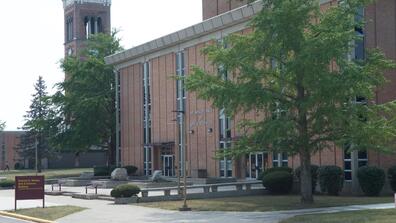Central State University to spearhead semiconductor research with $3M National Science Foundation grant

Central State University today announced its leadership role of a national HBCU (Historically Black Colleges and Universities) consortium through the Partnership for Advancing Research Capacity in Semiconductors at HBCUs (PARCS-HBCU), a $3 million project funded by the National Science Foundation (NSF).
Dr. Mohammadreza Hadizadeh, director of Central State's Semiconductor Education and Research Program, will serve as the lead principal investigator (PI) for this groundbreaking project.
According to the NSF, the award “represents a pivotal stride towards inclusivity and advancement in semiconductor technology, leveraging a consortium of seven Historically Black Colleges and Universities... designed to tackle persistent national challenges that limit access to advanced technological resources and opportunities for underserved communities.”
“Since its establishment in 2022 with seed funding from Intel, CSU's semiconductor program has rapidly progressed to a stage where it now leads a national consortium,” said CSU President Dr. Morakinyo A.O. Kuti. “This leadership role underscores the remarkable strides we've made in just a short time and showcases Central State University's ability to collaborate with leading institutions on pivotal research initiatives.”
“Leading this consortium marks a significant milestone for CSU, and together with other recent NSF funding our semiconductor program has secured, it paves the way toward our long-term goal of establishing a dedicated Semiconductor Education and Research Center here at CSU,” said Dr. Jose Toledo, CSU vice president for Research and Development and director of 1890 Land-Grant Programs.
The HBCU consortium will receive $3 million over three years to strengthen and enhance semiconductor research and STEM education. The consortium, led by Central State University, includes Alabama A&M University, Coppin State University, Fayetteville State University, Hampton University, Meharry Medical College, and North Carolina A&T State University.
According to the lead principal investigator, Hadizadeh, the “prestigious NSF award, spanning over the next three years, will enable CSU and its consortium partners to advance semiconductor research and synergistically build and improve the research capacity at all involved institutions to elevate STEM education.”
Hadizadeh added, “With our robust Intel-funded semiconductor program, extensive collaborations with STEM faculty across five other Ohio-based higher education institutions, and international partnerships with Brazil, CSU is exceptionally well-suited to lead this consortium. Our leadership enables us to share resources and expertise with our partners, while also substantially enhancing our own program at CSU. We are uniquely positioned to create a collaborative environment that benefits all members and advances our capabilities in semiconductor research and education.”
The PARCS-HBCU initiative will focus on four cutting-edge research areas:
- AI in Quantum Materials to Automation in Semiconductor Manufacturing
- Biomimetic Waste Remediation in Semiconductor Manufacturing
- Wide-bandgap Inorganic Semiconductors
- Organic/Inorganic Semiconductor Integration and Packaging
These research areas represent the forefront of semiconductor technology and set a solid foundation for transforming STEM education and research at HBCUs.
Hadizadeh, alongside co-PI Dr. Mubbashar Khan, will be supported by a distinguished team from CSU’s STEM faculty and administration, including professors Mahmoud Abdallah, Abayomi J. Ajayi-Majebi, Deng Cao, President Morakinyo A. O. Kuti, and Arunasalam Rahunanthan, interim dean of the John W. Garland College of Engineering, Science, Technology, and Agriculture.
This initiative underscores Central State University’s commitment to leading innovative research and emphasizes the essential role of HBCUs in enriching and diversifying the STEM workforce. Aligned with the CHIPS and Science Act of 2022, this project aims to substantially increase African American representation in the semiconductor industry.
Co-PI Khan said, “We aim to provide 30 scholarships for summer internships, train students in four key research projects and enhance our infrastructure by establishing two new labs and upgrading five existing ones. We will also develop three undergraduate and graduate certificates."
"Our consortium plans to conduct various K-12 workshops, offer online certificate scholarships, and strengthen industrial partnerships. Additionally, we will produce scientific publications and presentations and establish a central repository and website for the project.”
For additional details on this transformative project and its impact on the HBCU community, visit https://new.nsf.gov/news/ideas-labs-advance-research-capacity-nations-historically.
More information about the grant may be found at https://www.whitehouse.gov/briefing-room/statements-releases/2024/09/16/fact-sheet-biden-harris-administration-announces-1-3-billion-in-additional-funding-and-a-record-of-over-17-billion-in-total-support-for-historically-black-colleges-and-universities-hbcus/.


